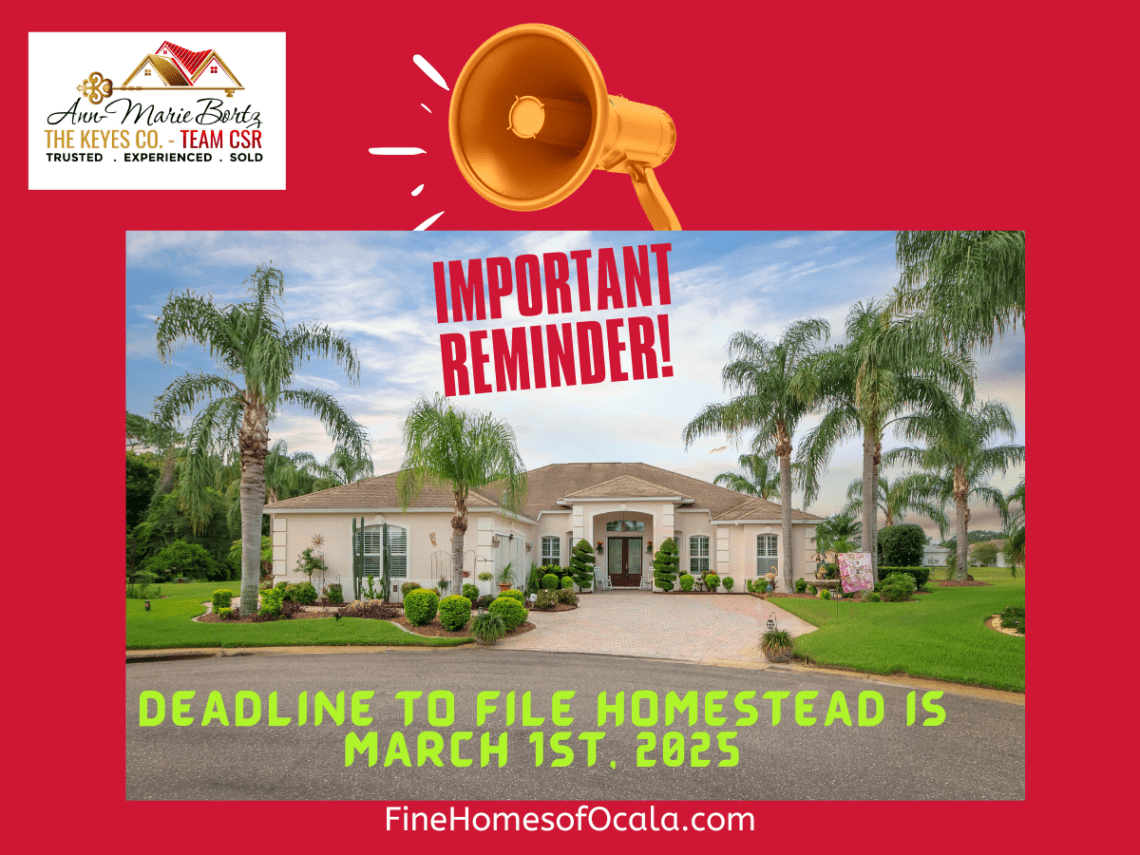
Florida Homestead Exemption: Key Filing Deadline for 2024 Homebuyers
If you purchased a home in 2024 as your primary residence and occupied it on or before January 1, 2025, it’s time to take advantage of Florida’s Homestead Exemption.
This essential property tax benefit can significantly reduce your annual costs and provide additional protections. Here’s everything you need to know to meet the filing deadline and maximize your savings.
What is the Florida Homestead Exemption?
The Florida Homestead Exemption allows homeowners to reduce the assessed value of their primary residence by up to $50,000 for property tax purposes.
The first $25,000 applies to all property taxes, while the second $25,000 applies to non-school taxes.
In addition to the tax reduction, the exemption offers:
Protection from creditors: Your homestead is protected from forced sale by most debt collectors under Florida law.
Assessment cap: The Save Our Homes (SOH) provision limits annual increases in the assessed value of your homestead property to 3% or the Consumer Price Index (CPI), whichever is lower.
This means your property taxes remain more stable, even if market values rise.
History and Purpose of the Florida Homestead Exemption
The Florida Homestead Exemption was established to promote homeownership and financial security.
Its origins date back to a time when some husbands, burdened by gambling debts or risky financial ventures, would lose their family homes to creditors.
It was not uncommon for a family’s primary residence to be seized due to unpaid debts after poor decisions at betting tables or high-stakes wagers.
In response to these hardships, Florida created the homestead exemption to shield primary residences from forced sale by most creditors, ensuring that families would not be left homeless due to financial misfortune.
However, it is important to note that certain entities can still legally seize a homestead property despite the exemption. These include:
Mortgage lenders: If you default on your mortgage, the lender can foreclose on your home.
Property tax authorities: Unpaid property taxes can lead to a tax lien and potential sale of the property.
HOA/Condo Associations: Failure to pay association dues may result in a lien and foreclosure.
Government agencies: Federal agencies can seize a home for unpaid federal taxes or fines.
The exemption’s primary purpose remains to protect residents from losing their homes due to unexpected financial challenges and to keep property taxes manageable over time.
Filing Deadline for the Florida Homestead Exemption
To qualify for the Florida Homestead Exemption, you must file your application by March 1, 2025.
Filing after this date means you could miss out on significant tax savings for the 2025 tax year.
For step-by-step filing instructions, check out this helpful guide: Florida Homestead Exemption Filing Guide.
Different Homeownership Scenarios for the Florida Homestead Exemption
The process for filing for the Florida Homestead Exemption varies depending on your homeownership and residency history. Here’s a breakdown:
1. Previous Florida Homeowners (Eligible for Portability)
If you previously owned a homestead property in Florida, you may qualify for homestead portability.
This allows you to transfer the Save Our Homes (SOH) benefit from your previous homestead to your new one, potentially lowering your new home’s taxable value.
Example: If your previous home’s market value was $300,000 but its assessed value was only $200,000 due to the SOH cap, you had a $100,000 SOH benefit.
When purchasing a new home for $400,000, you can transfer that $100,000 benefit, reducing the assessed value to $300,000.
2. New Florida Residents
If you’re moving to Florida and buying your first home in the state, you won’t have an SOH benefit to transfer.
However, you’re still eligible for the full $50,000 homestead exemption on your primary residence.
Key Tip: You will begin accruing SOH savings as your property appreciates in value, ensuring you benefit from capped assessment increases in future years.
3. First-Time Florida Homeowners
If you’re a long-time Florida resident but have never owned a home before, your experience mirrors that of new Florida residents.
You’ll receive the full $50,000 homestead exemption and start building your Save Our Homes benefit for future tax years.
How to Apply for the Florida Homestead Exemption
The application process is simple, with most counties offering online and in-person filing through the local property appraiser’s office.
You will generally need:
1. Proof of Florida residency, such as a Florida driver’s license or vehicle registration.
2. Proof of property ownership, such as a deed or closing statement.
3. Social Security numbers for all owners listed on the deed.
4. Ensure your residency and ownership information reflect that the home is your primary residence as of January 1, 2025.
Additional Considerations
Married couples: Only one spouse must qualify for the exemption, but it must apply to the primary residence.
Rental properties and second homes: The Florida Homestead Exemption only applies to primary residences and cannot be applied to rental properties or vacation homes.
Maximize Your Tax Savings with the Florida Homestead Exemption
The Florida Homestead Exemption is a vital tool for homeowners seeking to reduce their annual property taxes and protect their homes from financial risk.
By filing your exemption before the March 1, 2025 deadline, you can ensure you receive valuable savings and start building long-term financial security.
For questions or guidance on navigating the homestead exemption process, feel free to reach out me, Ann-Marie Bortz with the Keyes Company, at 352-405-1663.
I live in and service the N. Central Florida areas of Florida, including Ocala, Dunnellon, Lecanto, Gainesville, Citrus Springs and other surrounding cities.
Staying informed and filing on time can make a significant difference in your tax bill and overall peace of mind.
Ann-Marie Bortz, Realtor
Ann-Marie is a real estate agent in the Greater Ocala, Florida area with over 2 decades in the business. She is a veteran of the United States Air Force and her clients know her as a go-getter and pro-active agent specializing in the luxury market.

You May Also Like

4 reasons millennial homebuyers are here to stay
October 11, 2015tips on how to get your listings online
October 11, 2015